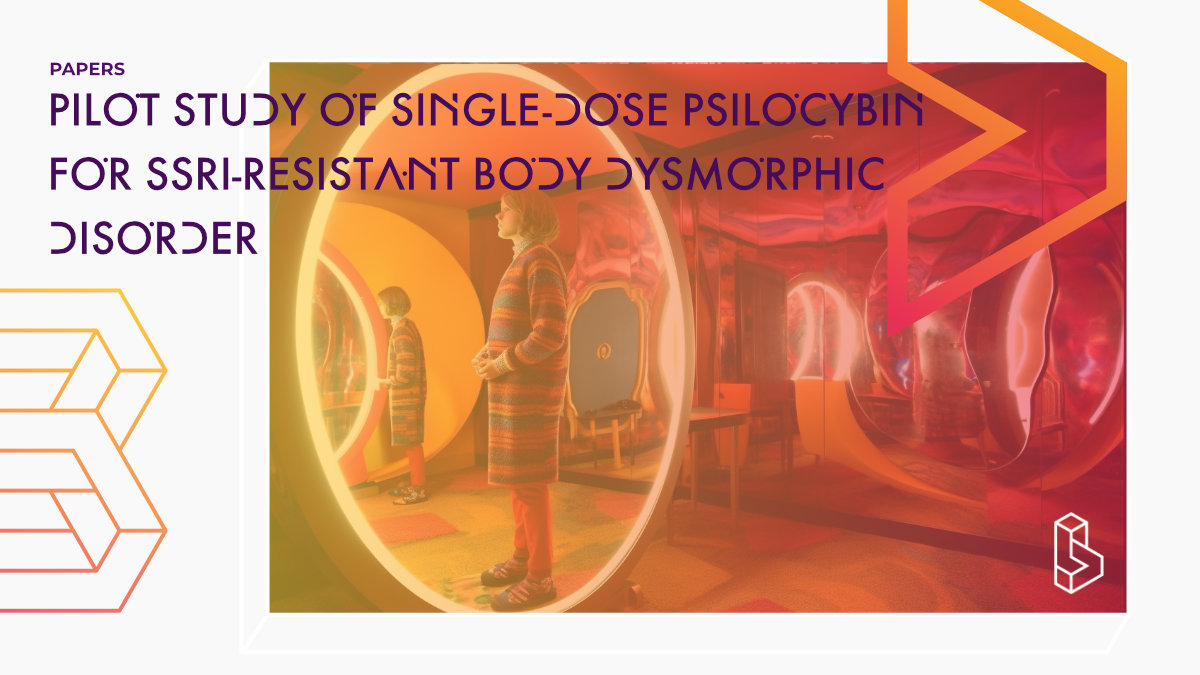This open-label study (n=12) of patients suffering from body dysmorphic disorder (BDD), an obsessive preoccupation with misperceptions of appearance, finds that psilocybin (25mg) plus psychological support (6 sessions) resulted in a response (>30% decrease in BDD-YBOCS) in 58% of participants. Secondary measures such as negative affect, disability, and conviction of belief also significantly decreased.
Abstract of Pilot study of single-dose psilocybin for SSRI-resistant body dysmorphic disorder
“Objective: Body dysmorphic disorder (BDD) is an often-severe condition in which individuals are preoccupied by misperceptions of their appearance as defective or ugly. Only serotonin reuptake inhibitors and cognitive-behavioral therapy have been demonstrated efficacious in randomized controlled trials. Psilocybin is a psychedelic drug with growing evidence for safety and efficacy in treatment of depression. This study aimed to pilot test the feasibility, tolerability, safety, and efficacy of psilocybin treatment of adults with BDD.
Methods: In this open-label trial, 12 adults (8 women, 4 men) with moderate-to-severe non-delusional BDD that had been unresponsive to at least one serotonin reuptake inhibitor trial received a single oral dose of psilocybin 25 mg. There was no control group. Psychological support was provided before, during, and after the dosing session. The primary outcome measure for efficacy was the Yale-Brown Obsessive Compulsive Disorder Scale Modified for BDD (BDD-YBOCS) score during 12 weeks of assessments after dosing.
Results: All participants completed dosing and all follow-up assessments. BDD-YBOCS scores decreased significantly over 12 weeks of follow-up (p < .001) with a large effect size (partial eta squared = 0.54), and significant changes from baseline were present at week 1 and persisted through week 12. Secondary efficacy measures of BDD symptoms, conviction of belief, negative affect, and disability also improved significantly, and no serious adverse events occurred. At week 12, seven participants (58%) were rated responders, based on ≥30% decrease in BDD-YBOCS.
Conclusion: This study provides promising preliminary support for psilocybin as a treatment of BDD, warranting future controlled studies.”
Authors: Franklin R. Schneier, Jamie Feusner, Michael G. Wheaton, Gloria J. Gomez, Giselle Cornejo, Akansha Mahesh Naraindas & David J. Hellerstein
Summary of Pilot study of single-dose psilocybin for SSRI-resistant body dysmorphic disorder
This study aimed to pilot test the feasibility, efficacy, safety, and tolerability of psilocybin in treating adults with BDD who previously had nonresponse to serotonin reuptake inhibitor (SRI/SSRI) treatment.
Exclusion criteria included current major depressive disorder, significant suicidality or attempt in the past year, bipolar disorder, psychotic disorder, borderline personality disorder, or dissociative disorder, alcohol or drug use disorder, significant cognitive impairment, and history of seizure disorder.
Find this paper
https://doi.org/10.1016/j.jpsychires.2023.03.031
Paywall | Google Scholar | Backup | 🕊
Cite this paper (APA)
Schneier, F. R., Feusner, J., Wheaton, M. G., Gomez, G. J., Cornejo, G., Naraindas, A. M., & Hellerstein, D. J. (2023). Pilot study of single-dose psilocybin for serotonin reuptake inhibitor-resistant body dysmorphic disorder. Journal of Psychiatric Research, 161, 364-370.
Study details
Compounds studied
Psilocybin
Topics studied
Obsessive-Compulsive Disorder
Study characteristics
Original
Open-Label
Participants
12
Humans
Institutes
Institutes associated with this publication
New York State Psychiatric InstituteThe New York State Psychiatric Institute (NYSPI), established in 1895, was one of the first institutions in the United States to integrate teaching, research and therapeutic approaches to the care of patients with mental illnesses.
Compound Details
The psychedelics given at which dose and how many times
Psilocybin 25 mg | 1xLinked Clinical Trial
Safety and Efficacy of Psilocybin for Body Dysmorphic DisorderIn this pilot study, 12 adult outpatients with body dysmorphic disorder that has not responded to at least one adequate trial of a serotonin reuptake inhibitor will be treated openly with a single oral dose of psilocybin. Follow-up visits to monitor safety and clinical outcome will be conducted over a 3 month period.

